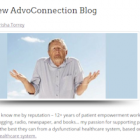Common scenario:
You have dreamed about becoming a private health /patient advocate or care manager for a while. You know you can do it, you know you are a good advocate, your heart really WANTS to change careers to advocacy, you know people need help with their medical system challenges…
Plus everyone you know thinks it’s a great idea! They all tell you “OMG! There is such a huge need!”
Maybe you have helped friends and family members over the years, or you have been a doctor or nurse for decades. (I often hear, I’ve been an advocate all my life. Now I just want to get paid for it!)
But something, maybe not clearly defined, is holding you back. Mostly it’s because you know you would have to start your own business to be truly independent (there’s the Allegiance Factor, after all) and you’re not sure you’ve got the chops to do that. You just can’t seem to make that leap from being a volunteer who steps in to help, to being a professional, privately-paid, patient advocate, navigator, or care manager in your own private patient advocacy practice.
You’re just stuck. Your heart is THERE! But your brain won’t let you move forward. Sound familiar?
Getting stuck in your own head when your heart wishes to make changes is called the paralysis of analysis. It’s our tendency to over-think, to worry that we’re not doing something exactly right, to be concerned that we’ve missed some important detail, to the point where it stops us in our tracks.
The BAD news is double-edged: Paralysis of analysis keeps us from pursuing our dreams. Even worse, it means the patients who need us, who we would help, may not get the help they need!
In other words, if you are among the paralyzed, there are people getting sicker or poorer because you haven’t thrown that switch. Ouch.
There are several causes for the paralysis of analysis, and they are all about questioning one’s own capabilities:
- Some people are afraid to throw the switch because they are unsure that they are really prepared. So, in classic avoidance behavior, they decide to take new courses, or to earn a degree, or begin some volunteer work, either focusing on advocacy or focusing on business. Then that becomes the excuse: I’ll go into business once I’m finished with ____. (Is this you?)
- Some people are afraid to let go of their current job. They dislike their jobs, or they are bored, or they are just ready for a change. But they continue to put off their dreams, becoming even more frustrated each day they postpone what they really want to do. Then they get upset with themselves for frustrating themselves. (Is this you?)
- Some go so far as creating triggers for themselves, like “If I don’t get a raise, then…” Or “If I have to work through lunch one more time, then…”. Or “If they pile on one more responsibility, then…” But then, when that trigger occurs, they simply think of a new one. (Is this you?)
- For some of the paralyzed, it’s a money question, as in, they are reluctant to ask a potential client-patient for money. How can they possibly ask someone to pay them for something they have always done out of the kindness of their hearts?

That’s the paralysis of devaluing one’s own capabilities, as in “you get what you pay for might be too true”, as in, “as volunteers, what we offered wasn’t great, but since we didn’t charge for it, it doesn’t matter.” This type of avoidance is a value proposition: “If I actually charge money, then people will expect me to actually do a good job.” Never mind that they are very good at doing just that. (Is this you?)
 You may have your own reasons for not throwing that switch. But they are all just excuses. Your analysis (or more like your lack of confidence) is causing you to pause unnecessarily. And patients are getting sicker, or paying too much for their healthcare, because you aren’t available to help them.
You may have your own reasons for not throwing that switch. But they are all just excuses. Your analysis (or more like your lack of confidence) is causing you to pause unnecessarily. And patients are getting sicker, or paying too much for their healthcare, because you aren’t available to help them.
So what IS the cure?
There’s definitely no silver bullet! No more than most patients can usually just swallow a pill or get an injection to cure them, there is no simple cure for this paralysis of analysis.
But the GOOD news is: there are definitely strategies and tactics to help you break through the wall ? and they aren’t difficult to implement.
You are Invited
We’re going to tackle those ideas on an upcoming APHA Expert Call-in and you are invited! We’d love to have to join us if you find yourself hesitating on realizing your independent (paid) advocacy dream. We want you to succeed! And we’ll support you to do just that.
The call will take place January 15, 2020. Learn more and register here. (You’ll need to register for the call to get the dialing details.)
Wait! There’s more! Registered callers who listen to the entire call can receive one (1) BCPA CE by answering a few questions once the call is completed.
Such a deal, right? Think about it:
- You can learn what it will take to throw that switch and go into business for yourself.
- You can earn a BCPA CE (no cost!) just by attending, then answering some evaluation questions afterwards.
- Patients who need you will be the biggest beneficiaries; think of the lives you will impact in such positive ways!
Win-win-win-win? What a great way to begin your new year and your new career. Let’s do this!
Update: January 16, 2020
We’re sorry. This call has been completed. APHA members may download the podcast and earn the CE here.
LEARN ABOUT APHA MEMBERSHIP | MASTER LIST OF PRACTICE RESOURCES | ONLINE COURSES TO LEARN ADVOCACY





